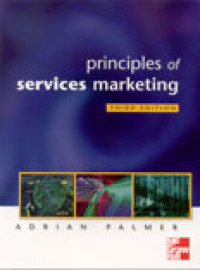
Principles of services marketing
| Gmd : Text
| Availability :
| 00000001646 | HF5415.13 .P3242 2001 | (General Book) | Available - Ada |
Today, more people in the western world earn a living from producing services than making manufactured goods. For consumers, increasing wealth has resulted in opportunities to consume services which were previously unattainable, or had to be produced within the household unit. For businesses, services are not a luxury, but have become essential inputs as firms concentrate on their core business activities and buy in specialist services from outside.
The growth of the services sector has presented many apparent paradoxes. Despite the efforts of service organizations to improve their quality standards, dissatisfaction has been seen to grow in many sectors, simply because firms haven't kept up with consumers' rising expectations. There is the paradox of many services companies developing relationship marketing programmes, but which result in relationships that are perceived by customers as being inferior to those which went before. The reason for such apparent paradoxes is that service benefits can only be defined in consumers' minds. With few tangible cues to go on, the same service can be perceived quite differently by two different consumers.
This book develops frameworks for understanding services and the effective marketing of them. The characteristics of intangibility, inseparability, perishability and variability have profound implications for the way that marketing managers in the services sector develop their service offer, promote it and then deliver it. Traditional marketing mix frameworks that apply to manufactured goods do not work well for services. Services are about processes as much as outcomes and these processes often involve considerable interaction between customers and operations people. It follows therefore that marketing cannot be seen as an isolated function within an organisation. Successful service companies make sure that their front line people can competently deliver the promises which marketing people make to customers. Services marketing cannot be separated from services management.
This book begins by trying to define services and assessing the impacts of core service characteristics on marketing activities. In some aspects of marketing, for example pricing and promotion, the general principles of marketing can be adapted to meet the needs of services. In other aspects, new principles are called for. For this reason, a chapter is given to studying the service encounter where customers become involved in the service production process. Another chapter is devoted to studying the interface between human resource management and marketing, something which is vital for the success of people-based services. Other themes which are emphasised in this book are the importance of information management and the development of relationship marketing policies. The final chapter considers the problems and opportunities open to firms expanding overseas in increasingly competitive global markets for services.
To illustrate the general principles of services marketing, each chapter contains contemporary examples of good practice drawn from successful services organisations around the world, and each conculdes with a case study. The division of the material in this book into 15 chapters is to some extent arbitrary and successful marketing must recognise the inter-relatedness of all of the subjects covered. For this reason, each chapter concludes with a summary of key linkages to other chapters. Suggestions are also made for further reading and useful websites.
Coverage of the Internet and E-Marketing, including web links, has been expanded and integrated throughout the text where appropriate
More theoretical coverage is provided throughout the text
A more comprehensive case study positioned at the end of the text links to preceding chapters to highlight concepts raised throughout the book
More diagrams and illustrative examples to highlight the key concepts in each chapter
New colour text design improves the presentation and navigation of material.
Table of contents:
What Is Services Marketing?
The Service Offer
The Service Encounter
Services Buying Processes
Relationship Marketing And Customer Loyalty
Managing Knowledge
Service Positioning And Targeting
Service Quality
Making Services Accessible To Consumers
The Pricing Of Services
Promoting Services
Internal Marketing
Managing Capacity
Managing The Marketing Effort
International Marketing Of Services
Integrative Case Study
Glossary Of Terms
Bibliography
Index
| Series Title |
Mcgraw-hill/irwin Marketing Series
|
|---|---|
| Call Number |
HF5415.13 .P3242 2001
|
| Publisher Place | London |
| Collation |
xvi, 516p.: ill.; 24cm.
|
| Language |
English
|
| ISBN/ISSN |
0077097483
|
| Classification |
HF5410-5417.5
|
| Media Type |
-
|
|---|---|
| Carrier Type |
-
|
| Edition |
3rd ed.
|
| Subject(s) | |
| Specific Info |
-
|
| Statement |
-
|
| Content Type |
-
|
No other version available







